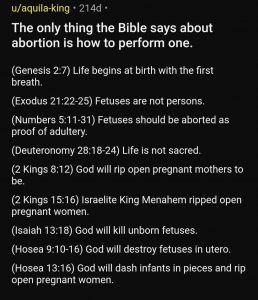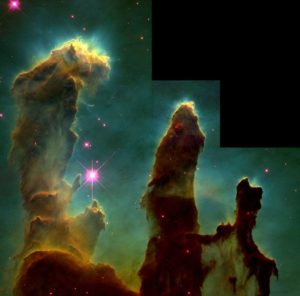If you've never heard of Aron Ra, you are probably not an atheist. Don't feel too bad. He's rather famous, but mostly limited to secular/humanist circles. If the "Four Horsemen" of atheism, meaning Richard Dawkins, Sam Harris, Daniel Dennett, and the late Christopher Hitchens, represent the creme of the crop of people who have become famous for evangelizing atheism, then Aron Ra ranks only one notch down on the totem pole, in the second tier of revered atheists with Seth Andrews and Matt Dillahunty who are collectively known as the "unholy Trinity." Mr. Ra is the host of the "RaMen" podcast, a frequent lecturer, and creator of the Phylogeny Explorer Project. These people have successfully turned their talent arguing for atheism into full-time jobs with career opportunities. They travel all over the world, giving lectures to crowds of adoring fans. Not a bad gig, if you can get it. No wonder he's smiling. photo by R. van Elst via Creative Commons Now before I write another word, I would like to acknowledge that Mr. "Ra" (obviously not his birth surname) is quite an intelligent man, and I'm delighted to say he possesses an ego that easily matches and possibly exceeds my own. I personally find the guy quite entertaining. Mr. Ra has a Wikipedia biography that claims he studied paleontology in Dallas, but does not mention a college degree. Don't let that fool you. He's very clever and bright, as well as apparently smart enough to run away from a fight he was unlikely to win--an argument with me about the relevance of creation. During the course of our recent … [Read more...]
The implied beliefs of atheism
[AUTHOR'S NOTE: Hat tip to TC and Emily for serving as inspiration for this article.] Atheists typically don't like organized religion, and many will seize just about any excuse to attack the beliefs of theists. Only yesterday a friend of mine posted a political comment on social media that mentioned abortion, yet somehow an atheist lurking in the shadows managed to bring religion into the conversation by claiming the Bible doesn't condemn abortion. In my response I pointed out that Scripture doesn't mention nuclear war or space travel either, because those things also didn't exist when the Bible was written. Elective surgery by a medical doctor to kill an unborn child in the womb wasn't simply available when Jesus walked the Earth. 13 weeks into pregnancy His argument was weak, but my new atheist acquaintance was just getting warmed up. Next this particular religion critic boldly claimed the Bible was a work of fiction, which is an odd statement for an atheist to make. Most of my atheist friends realize the best strategy is to remain on offense and attack religion while carefully avoiding any knowledge claims they might have to defend. For example, most atheists will say something safe like "I believe the Bible is fiction" instead of "the Bible is fiction" because the former is merely stating an opinion, but the latter is a knowledge claim that will ultimately need to be defended with empirical evidence. Everyone is entitled to have an opinion, but not their own independent set of facts. And the fact of the matter is, the claim the Bible is a work of fiction … [Read more...]
A Universe From Nothing
I've been thinking about writing another nonfiction book in the same vein as Divine Evolution and Counterargument for God. The tentative title of this planned new work is God or Good Luck? The difference between this new book and those first two books is that I don't plan on quoting anybody else, only to cite their work and suggest to my readers that they should investigate on their own. No footnotes, or end notes, and no need for a bibliography. In my opinion, not only should you doubt everything I say and investigate it on your own, you should take that approach with anything you read, no matter who wrote it. This time I plan to begin my argument at the beginning and take it straight through to the end in the most coherent manner possible, so the point I'm trying to make is so crystal clear and no one could possibly claim to be confused, not even my harshest critic (who skipped over most of the book he critiqued). Even the title of this proposed new book is pretty self-explanatory...the best explanation of "everything" or anything can be easily boiled down to a dichotomy of only two real choices: it's either God or good luck. Any and every other potential answer can ultimately be shown to be an inferior (and inadequate) substitution for one or the other--whether that suggested alternative is claimed to be science, nature, multiverses, quantum physics, string theory, an invisible wizard who lives in the sky, or even a flying spaghetti monster. Every one of them is a form of good luck, or represents a god. Absent a creator God, the existence of our universe becomes … [Read more...]
A Universe From Nothing
Pillars of creation photo: NASA, Jeff Hester, and Paul Scowen (Arizona State University) I keep telling myself that I've said all I needed to say in my first two nonfiction books (Divine Evolution and Counterargument for God) but then I realize that the issue still hasn't been resolved and so the debate isn't over. It's never going to be over, but that doesn't mean I'll be writing nonfiction books and articles rehashing the same points, over and over. When the spirit moves me (literally) I can't let it go. I think there's a third book in the works that will be titled God or Good Luck? Whether or not you understand that fact, those are really your only two choices. Nobel Laureate Werner Heisenberg famously made the most honest and truthful statement about atheism I've ever read: "The first gulp from the glass of natural sciences will turn you into an atheist, but God is waiting for you at the bottom of the glass." What does that mean? It's actually pretty simple. I can speak from experience, because it happened to me. I had graduated from a "Christian" high school that provided a quality education that was careful not to conflict with any biblical teachings. As a result, the first time I ever heard the term "The Big Bang" to describe the origin of the universe was in college. I had not been taught that science believed humans and apes shared a common primate ancestor and had "evolved" from more primitive species as an indisputable fact...it was merely what some biologists believed. I had been taught from the perspective of Young Earth Creationism, and so college … [Read more...]
A Universe from Nothing
Not long ago I was having a conversation with an atheist acquaintance on social media about the origin of the universe and my friend suggested "nobody" believes there was ever a time when literally nothing existed. Naturally, my response was something along the lines of "Oh, really?" and I posted the Amazon link to physicist Lawrence Krauss' book A Universe From Nothing, the title of which would seem to refute his claim. photo by REUTERS/Leah Millis Curiously, he asked if I'd read the book (as if I'm in the habit of recommending books I didn't write nor haven't read). I didn't bother explaining that I'd first read the book approximately six years ago and had written a review published as the Atlanta Creationism Examiner for the now-defunct Examiner.com website. I briefly entertained the idea of simply republishing the original article here at my website, but that review seemed dated, so I decided not to re-post it. Then, out of the blue, another atheist acquaintance in yet another "discussion" forum posted the link to another six-year-old review of Krauss' book by David Albert, returning it to the forefront of my mind. Which brings us here. Technically speaking, my atheist friend's argument had been correct in the sense that physicists and cosmologists have explained prior to the creation of our universe, time did not exist because it had no means to measure it, given that our measurements for time are exclusively defined by the universe. Thomas Aquinas famously suggested that our universe began with time, not in time. God created the universe literally ex … [Read more...]




